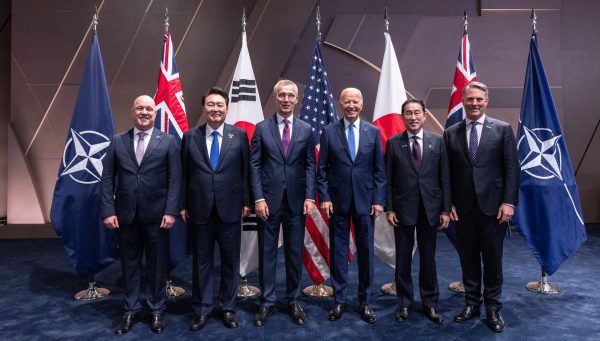The Diplomat author Mercy Kuo regularly engages subject-matter experts, policy practitioners, and strategic thinkers across the globe for their diverse insights into U.S. Asia policy. This conversation with William Alberque – a nonresident fellow at the Henry L. Stimson Center and former arms control expert at NATO and the U.S. Departments of State and Defense – is the 445th in “The Trans-Pacific View Insight Series.”
Does the involvement of North Korean troops in Russia’s war on Ukraine indicate growing security interlinkages between the Euro-Atlantic and Indo-Pacific regions?
North Korea’s entry into Russia’s war against Ukraine is the latest proof that the security of the Euro-Atlantic and Indo-Pacific region are inextricably linked. The linkages span from the obvious – the mainland of Russia, the U.S., and Canada all span both regions – to the indirect, including the global effects of local and regional conflicts. A large-scale conflict in Asia – particularly in the South China Sea, the Taiwan Strait, or the Korean Peninsula – would have profound effects on global trade and relationships, even beyond the disruption in energy and food markets caused by Russia’s war on Ukraine. Countries around the world would be forced to choose sides or otherwise dragged into the conflict against their will.
What might a kinetic conflict in the Taiwan Strait, Korean Peninsula, or South China Sea portend for European military engagement?
Imagine, for instance, a conflict between the U.S. and China over Taiwan or the South China Sea. China may declare the naval vessels of NATO allies as hostile if they do not declare neutrality and leave the theater. Countries of the Euro-Atlantic will face problems evacuating their citizens from the combat zone, and countries in the region may be pressured by either side to allow use of their airports or seaports to support combat or medivac operations. The conflict would quickly become global.
On the Korean Peninsula, North Korea has threatened European states for cooperating on sanctions and made it clear that any ally of the United States is fair game in a conflict between the two sides. Regardless, several U.S. allies remain parties to the armistice on the Korean Peninsula as participants in the United Nations Command. The U.N. Command, formed by the United Nations to stop North Korea’s aggression against South Korea in 1950, remains a legal party to the conflict – meaning that if North Korea were to resume its war against South Korea, Australia, Belgium, Canada, Columbia, Denmark, France, Greece, Italy, New Zealand, Netherlands, Norway, Philippines, South Africa, Thailand, Turkiye, the U.K., and the U.S. would be parties to the conflict. North Korea also would strike sites that would support U.S. forces in any conflict with South Korea in Japan and other locations across the Pacific, instantly widening the war. It, too, might declare any NATO forces in the region as hostile and target them.
Identify key geopolitical and security risks for Japan and South Korea if Russia were to pursue incursions in NATO territory.
War between NATO and Russia would have an Indo-Pacific dimension. Russian military forces – including Iskander missiles and substantial ground forces – have been moved from the Far East to the West for its war against Ukraine. Both NATO and Russia would assume the same if war were to break out between the two sides in Europe. Hence, NATO allies – especially the U.S. and Canada – would likely strike Russian forces in the Far East to prevent their use in Europe.
Following this logic, Russia likely would strike U.S. forces in the Far East in the initial stages of a conflict against NATO to prevent such strikes. It also would seek to blind Japanese and South Korean radars and other key enabling assets that could support U.S. forces. Therefore, counterintuitively, a surprise attack by Russia against NATO might begin with strikes on U.S. forces based in Japan and South Korea, as well as critical infrastructure across both countries. These Russian plans were long suspected, and recently proven by documents leaked to the Financial Timeswhich I have reviewed.
North Korea and China also may seek to take advantage in Asia if U.S. forces are engaged in conflict elsewhere – so-called “opportunistic aggression.” It is easy to imagine that if the U.S. were engaged fully in a conventional conflict with Russia in Europe, or against Iran in the Middle East, that North Korea or China would seize the moment to take advantage of depleted U.S. forces and attention elsewhere. North Korea may be compelled to do so through its obligations under the North Korea-Russian Treaty on Comprehensive Strategic Partnershipwhich includes the obligation to “provide military and other assistance with all means in its possession without delay.” Opening a second front against U.S. forces in South Korea and Japan would be an obvious way to fulfill this obligation. While China is not obliged to do so, it certainly would be tempted to take action.
Analyze NATO’s strategic thinking behind engaging key Indo-Pacific partners through the IP4 (Australia, Japan, New Zealand, and South Korea) framework.
NATO has sought to address some of these security conundrums through cooperation with its partners in the Indo-Pacific, including statements condemning North Korean nuclear and missile tests and increasingly close defense and intelligence coordination with Australia, Japan, New Zealand, South Korea, and Ukraine in understanding and responding to the increasing threat posed by North Korea to global – and increasingly European – security. Ukraine’s involvement stems directly from North Korea’s involvement in Russia’s war. These NATO consultation have facilitated closer defense cooperation within the IP4 grouping to make potential future military responses to North Korea’s regional and global actions easier.
Assess the strategic implications of the increasing nexus between Euro-Atlantic and Indo-Pacific security theaters for U.S. global leadership.
All of these developments will pose challenges to the new Trump administration. Will they continue to build on the decades-long, strong defense and security relationships to face Chinese and North Korean threats, or will they return to a transactional relationship with the countries in the region, leaving China with a free hand to realign the region in its own favor and leaving North Korea emboldened to support Russian interests in other regions? The choice is stark, the outcomes fairly clear – alliances work when we realize the indivisibility of security between the Euro-Atlantic and Indo Pacific regions.











